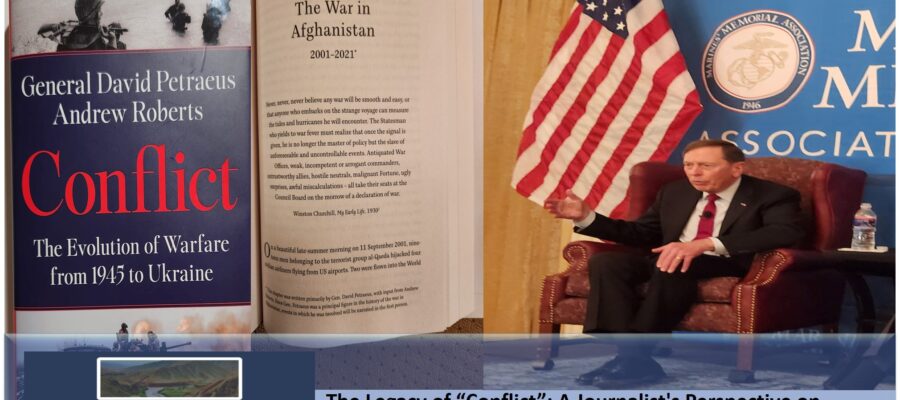As an embedded freelance journalist with the United States Army Airborne 82nd and 101st, as well as U.S. Special Forces during General Petraeus’ command in Afghanistan, I witnessed firsthand the complexities of the war. Little did I know, years later, I would find myself once again face-to-face with the General himself, discussing his latest book, “Conflict,” in San Francisco. As with many other conflicts, the book delves into the tumultuous fall of Afghanistan in 2021 and makes the well-supported claim that the politicians at the helm, driven by personal political interests, deliberately ignored the advice of their trusted General and security advisors, with devastating results.
What struck me most about “Conflict” was not just the meticulous historical analysis, but the astute foresight woven into its pages. General Petraeus, with his dual perspective as both Army General and CIA Director, paints a nuanced picture of Afghanistan’s struggles. I saw it all unfold in real time – the victories, the setbacks, the sacrifices, and the unwavering commitment of our troops.
Page 235 of the book resonated deeply. General Petraeus’ candid assessment of the 2001-2021 conflict, particularly his concerns about the future, echoed my observations and concerns as a journalist embedded in the thick of it.
One specific incident from September 15, 2009, etched itself into my memory. Witnessing the loss of several Afghan Special Forces and U.S. forces while covering the Afghan Local Police (ALP) training in Wardak Province solidified the gravity of the situation. The dedication and sacrifice of those men reminded me of the immense human cost of the conflict.
General Petraeus’ assertion that Afghanistan, “however imperfect, flawed, and frustrating,” is in a far better state than it could have been, rings true. However, the book also lays bare the missed opportunities and strategic missteps that ultimately led to the disastrous withdrawal in 2021.
At the Jan 18th Meet the Author event in San Francisco for his new book, “Conflict”, General Petraeus said, “Afghanistan, however imperfect, flawed, and frustrating, I believe is far, far better than what was likely to happen. I said at the time publicly, I feared we’d regret this decision and I hope that we have because it is truly a disastrous outcome. But we only had 3500 troops on the ground and the cost was 25 billion out of an 850 billion defense budget. We had not lost a soldier in 18 months, and not because of the flawed agreement that the previous administration did, but because we were no longer on the front lines. We were doing what’s called advice, assist, and enable, which is the way we should always try to be doing it if we can.”
The book’s pages unveil truths beyond the battlefield. The section on counter-intelligence operations, particularly Karzai’s agreement with Obama and Biden, raises a critical question: Why was this crucial strategy ultimately undermined? Did political interests supersede national security concerns?
As a journalist who repeatedly raised concerns, along with multiple intelligence experts, about ISIS-K’s activities in eastern Afghanistan as early as 2010, only to be met with skepticism, I can only conclude that the dismissal of expert advice was due to political interest.
“Conflict” is not just a historical account; it is a cautionary tale. It serves as a reminder of the human cost of war, the importance of strategic foresight, and the perils of political expediency. It is a book that demands to be read, discussed, and its lessons learned, or else Afghanistan’s tragedy will become a recurring chapter in history.

As a journalist who bore witness to the conflict firsthand, I believe General Petraeus’ “Conflict” is a vital document for anyone seeking to understand the complexities of Afghanistan and the lessons learned for future interventions. It is a book that will continue to resonate for years to come, serving as a reminder of the sacrifices made and the responsibility we hold to ensure such a tragedy never unfolds again.
“Conflict: The Evolution of Warfare from 1945 to Ukraine” by General David Petraeus and Andrew Roberts can be found wherever books are sold.




